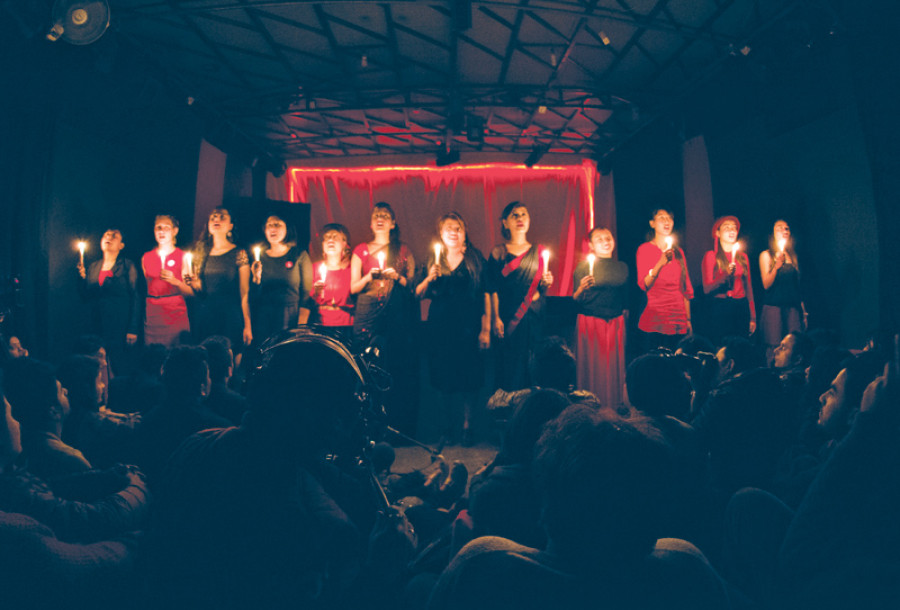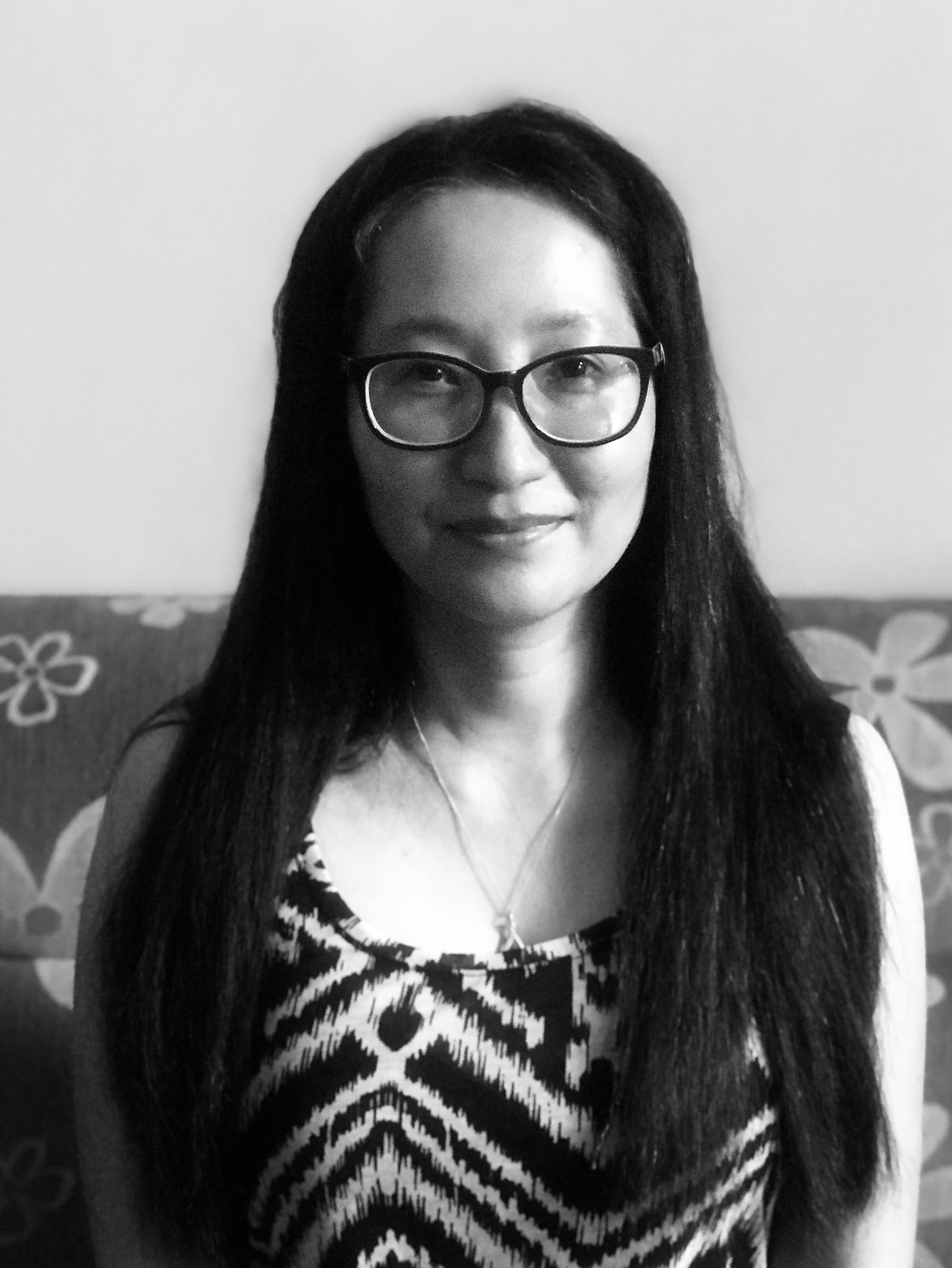Miscellaneous
Not vulgar. Against violence.
The Vagina Monologues is a play written by American feminist playwright, Eve Ensler, weaving together monologues based on interviews done with women of different age groups and backgrounds. The monologues are based on the topics of sex, rape, menstruation, love, masturbation, orgasm, genital mutilation, birth and sexual violence meted out to women in different forms. The play, initially performed by Ensler alone in 1996, has become phenomenal, as women across the world have performed it in different languages, making it a fight against violence against women. Nepal saw its second consecutive performance this year.
Prateebha Tuladhar
The Vagina Monologues is a play written by American feminist playwright, Eve Ensler, weaving together monologues based on interviews done with women of different age groups and backgrounds. The monologues are based on the topics of sex, rape, menstruation, love, masturbation, orgasm, genital mutilation, birth and sexual violence meted out to women in different forms. The play, initially performed by Ensler alone in 1996, has become phenomenal, as women across the world have performed it in different languages, making it a fight against violence against women. Nepal saw its second consecutive performance this year.
Learning to accept
When I walk the streets alone at night, I try to ignore this fear that gnaws at me constantly. I feel the fear accumulate under my navel. When I joined the vagina monologues group in Kathmandu last year, I floated this question to the young women who were part of the group. It turned out to be a collective fear. The fear of physical harm is the fear of being violated. Of being raped. It’s like a constant dread we carry, because we have seen from our own and others’ experiences that humans are quick to hurt others. And rape is not just an injury to the body but also to the brain that has long-term consequences.
The group bonded in mutual scars. Growing up, I suffered from severe urinary tract infection, which led to a permanent enlargement of my left kidney. One of the girls I met at the group, Sumnima Sampang, recalls her childhood as being all about the blisters in her vagina. For the eight-year-old, having to spread her legs before the strangers and male caregivers for examination and treatment, was an excruciating experience. It led to her developing a detachment with her vagina.
That feeling has started to change for Sumnima, ever since she joined the vagina workshop. Last year, she joined Madalena's Nepal, a network of women in theatre. The group initiated the vagina workshop, with the objective of training its 13 women members to perform Eve Ensler’s, The Vagina Monologues.
“My vagina was this filthy place for me,” Sumnima tells me, raising her hands and spreading her fingers like she was pushing something invisible away, an indication that the place was meant to be separated from her self. “I always had this feeling of dirtiness and disconnection with my vagina. Even after my wounds had healed, I had very negative emotions attached to my vagina.”
The 2016 Vagina Monologues was the second consecutive performance of Ensler’s play for Sumnima. And she describes the process as something that helped her and the other participants heal.
“We started with our own stories at this workshop. Because we are all women, it was easy to share our sexual experiences. And it’s given us strength because it’s not just one person’s story anymore. We’re in a circle sharing stories”.
After eight years of work as a theatre artist, the Vagina Monologues was a performance of a different kind for Srijana Adhikari. The 27-year-old found the script very challenging. And she had been told that the first time the monologues were staged in Kathmandu in 2010, the audience had reacted in an uproar condemning the soliloquies as an ‘elitist’ and ‘vulgar’ presentation that did not represent Nepali reality. It made her anxious.
“People responded with applause during our performance and we had a full house. But the most important response was from my husband.”
“Some of the instances in the play made me wonder if Srijana had been through some of the bad experiences mentioned. I had watched her perform other plays, but this made me very emotional. I was in tears,” Sulakchyam Bharati, looks away from talking to me to beam at his wife.
Srijana, says the workshop helped her speak out about harassment. Most of all, she says it’s helped her take her relationship with her husband to a new level.
“When I was newly married, I was awkward to talk to my husband even about my period. This has given our relationship a maturity. It’s given my confidence a boost. I can talk to my husband about sexuality now.”
Preet Shah, who has been performing the monologues for the second consecutive year, with the Hamri Bahini group, shares this experience.
“I am not scared to ask for what I want, I am happy and confident about myself and this is exactly how I wanted my sex life to be,” says the social worker who wants to use her strength to help other women. “As performers, we want the audience to rethink their perceptions on the topic of sexuality, vagina, sex. We hope to bring a change in the society, with the help of our audiences. Our aim as performers is not to make anyone uncomfortable but to encourage ease and acceptance”.
Bivishika Bhandari, who has been leading the group performing the monologues in English, says the experience is an opportunity for her to create a space for herself and others to talk about vulnerabilities, in what she calls ‘a political yet a personal journey’.
“It is relevant because we don’t talk about gender, sexuality, bodies, vaginas and stories of violence against women and of love openly and freely. It has always been a hush-hush issue that is why it gives rise to more violence. This is an attempt to have such conversations openly”, she says.
For Parikshya Lamichhane, who is a nurse by profession, more than the performance itself, it’s the process— spending time together— that really made a difference. She describes the workshop as being a magical and therapeutic journey that helped the members bond over their personal stories.
“Having my family at the show was slightly embarrassing. But they loved it. It’s what we discussed that night over dinner. It was unbelievable!” laughs Parikshya. “My father said I was brave!”
Acceptance is probably what the soliloquies has helped the performer achieve— not only acceptance by others, but first, by the self.
“I’m one of the girls who has never touched her clitoris,” Sumnima smiles. “I think I should do it when I am more comfortable about it. But I’ve started to love my vagina”. She tells me how we think about the vagina isn't what society teaches us.
It is what she has learnt recently— that it was a wounded part of her body that needed to be nursed back to health.
Moaning in the mother tongue
Aakancha Karki, 25, who has performed the Vagina Monologues for the past five years, first in India and then in Nepal, felt that in order for the audience to receive the Vagina Monologues properly, it was important to tell the story sensitively.
“It’s not reading someone a story but telling your own. lf you are not confident, how will you put across a story of someone else’s sexuality? The justice is really important.”
Therefore: the vagina workshop.
When the Madalena's Nepal brought together a group of women actors, Akanchha came up with a list of creations.
“We prepared a list of words related to sexuality— masturbation, orgasm, oral sex. We spent hours discussing those words. We got talking about those things. We talked about gender.”
While the term ‘vagina’ comes across as being about only one category under gender, it includes the transgender community, highlighted in the piece, “They beat the girl out of my boy. Or they tried.”
During the workshop, each actor talked about their sexual experiences, about their childhood, about abuse. The discussions had a cathartic tone, and they were held in a very confidential spectrum, which helped actors open up about their lives. It was important for them to be able to take someone else’s story as their own and perform it.
“In about three months, we worked in tighter groups. Only the last three weeks were spent on the script,” Akanchha says.
The highlight of the entire process for Akanchha has been the translating of the text, which gave birth to Yonika Kathaharu. Before the workshop, she got together with her friends and spent ten days on the script, discussing how to translate it "without killing the essence and without making it sound vulgar’".
“The translation and adaption were most important because this couldn’t be about an affluent person. It had to cater so someone who hadn’t gone to school, as much as to someone who had. It needed to be done very tastefully and in a way that was inclusive of everybody.”
Akanchha, along with her friends Pratikshya Kattel, Sabhyata Timsina and Gunjan Dixit translated the script. They performed alongside, to make sure the script worked as a Nepali version.
“The moment you say ‘vagina’ people consider it vulgar. We didn’t want people to misunderstand. In order to make ‘cunt’ sound softer for the Nepali audience, we used the word ‘puturo’. The overall message was our priority. We didn’t want to kill the essence. We were careful not to make it sound vulgar,” explains Pratikshya.
The translators had to make use of metaphors to explains some things, and sometimes throw in a line to contextualize the experience.
“We took the liberty to modify the text which is actually against the rule,” says Akanchha. “In order to bring people close, rather than push them away, we tried to make it much more welcoming by using a lot of colloquial metaphors and proverbs. Like, teska baje tampon na sampon.”
And performing in the mother tongue made the play more interactive. Akanchha was confident to invite her mother to her performance finally, because she knew she would be able to watch it as a work of art and storytelling and without having to cringe.
The journey has been a challenging one, in more than one way. The group was at the receiving end of a lot of criticism. They were berated during their rehearsals for the use of the word ‘vagina’ too many times and for working like a feminist circle, a term often hurled at women in negative light. But the women say, there’s only one thing they want to tell their audiences though their performance. That it’s okay to talk about your body because it’s the only way to learn to speak against sexual violence.
“If you accept celebration of sexuality, you also acknowledge that violence can come with it and you take measures to prevent it,” Akanchha says. “Sexuality is not separate from who you are, regardless of your gender”.
NOTE: Yonika Kathaharu will be performed at Rato Bangla School on March 8th by the Magdalene’s Project. The Vagina Monolgues will be performed at Shilpee Theatre on March 5-7, as a Hamri Bahini fund-raising initiative.
CORRIGENDUM: We would like to apologize to sources and the writer of "Against violence. Not vulgar", published on March 6, 2016, issue of On Saturday for the slip-up that made it read like Sumnina Sampang and Srijana Adhikari were the same person.




 8.12°C Kathmandu
8.12°C Kathmandu










